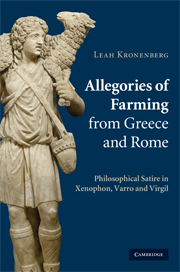6 - Virgil's satire on farming
from PART III - VIRGIL'S GEORGICS
Published online by Cambridge University Press: 03 May 2010
Summary
While my analysis of the De Re Rustica presents an unfamiliar way of reading that work, many of the conclusions I have drawn about it (and the Oeconomicus) are commonly made about the Georgics. For example, many readers find in the Georgics lessons about the failure of ars or ratio to control the chaos of nature (and human nature); an association of the farmer with materialistic ethics; contradictory moralizing about the life of the farmer and the land of Italy; analysis of the deficiencies of political life via animal-human analogies, and the presentation of a contrasting contemplative ideal. Thus, it will not be as difficult to demonstrate that these themes appear in the Georgics, and my goal is not to give an exhaustive analysis of them so much as show how deep an imprint Varro's work, in particular, left on the Georgics. Ultimately, my analysis of Virgil's incorporation of Varro's satire on farming will bring into relief the ways in which the Georgics differs from the works of both Xenophon and Varro, as I will explore more in the next chapter.
THE FAILURE OF KNOWLEDGE
In book 1 of the De Re Rustica, Varro parodies Late Republican intellectual culture via the dialogue between Scrofa, the modern expert, and Stolo the old-fashioned teacher. Not only do Scrofa and Stolo end up sounding more alike than different, but they both come off as incompetent pedants.
- Type
- Chapter
- Information
- Allegories of Farming from Greece and RomePhilosophical Satire in Xenophon, Varro, and Virgil, pp. 132 - 155Publisher: Cambridge University PressPrint publication year: 2009

